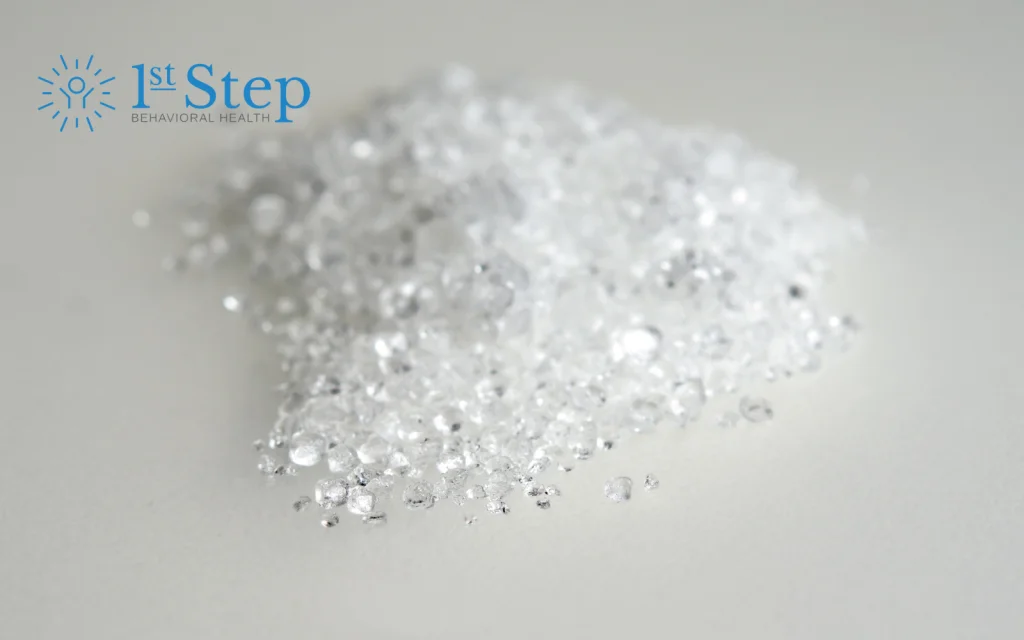Angel dust, a slang term for phencyclidine (PCP), is a powerful dissociative anesthetic drug that people abuse recreationally for its psychoactive effects.
In this article, you will learn:
- What is PCP?
- Street names and slang terms for PCP
- Side effects and addiction potential
- Long-term effects of PCP abuse
What is PCP?
Phencyclidine, known as PCP or angel dust, is an illegal hallucinogenic drug. It is sold in the form of a white crystalline powder that is snorted or smoked after being mixed with cannabis or tobacco. The powder is sometimes pressed into a tablet or capsule that is swallowed. PCP powder is readily dissolvable in water, so it may also come in the form of a liquid that can be injected intravenously.
Whether in the form of a powder or liquid, the drug has a distinctive bitter chemical taste. When ingested, it can cause strange and unpredictable effects on the mind and body. People often report feeling colors, seeing sounds, or feeling as though they are outside of their own bodies.
PCP was originally developed in the 1950s as a medical anesthetic. It was discontinued in 1965 due to extensive reports concerning side effects like postoperative delirium with hallucinations.[1] Today, the drug remains illegal in the United States and is designated a Schedule II Controlled substance which indicates a high risk for abuse and dependence.
Common Street Names for PCP
Angel dust is a popular street name for PCP. Others include:
- Fairy dust
- Boat
- Love boat
- Rocket fuel
- Hog
- Shermans
- Wack
- Ozone
- Peace pill
- Dust
- Embalming fluid
- Wets
- Waters
- Supergrass
- Fry
- Lovelies
Side Effects of PCP
Phencyclidine is a mood-and-mind-altering hallucinogen that can cause significant impairment in low to moderate doses. In terms of pharmacology, PCP functions as a noncompetitive antagonist of the NMDA (N-methyl-D-aspartate) receptor and glutamate receptor. Additionally, it interacts with various other receptor sites, potentially influencing dopamine, opioid, and nicotinic receptors.[2]
PHP increases activity in the central nervous system (CNS) and changes the way people perceive their senses and environment. Its effects can be difficult to predict, and adverse effects or “bad trips” are often reported. Disturbing hallucinations and violent behaviors are the primary drivers behind PCP-related emergency room visits.[3]
Physical side effects:
- Fast breathing
- Increased heart rate
- Blurry vision
- Dizziness
- Reduced feelings of pain
- Changes in blood pressure
- Slurred speech
- Blank stare
- Vomiting
- Numbness in the arms and/or legs
Psychological side effects:
- Feeling detached from one’s self or surroundings
- Out-of-body experiences
- Anxiety
- Panic
- Auditory, tactile, and visual hallucinations
- Difficulty thinking clearly
- Amnesia
- Confusion
- Delusions
- Paranoia
- Aggression
- Violent behavior
- Suicidal thoughts
In high doses, PCP abuse can lead to:[3]
- Low blood pressure
- Slowed pulse
- Shallow breathing
- Low respiration rates
- Drooling
- Seizures
- Coma
- Overdose
Overdose is most likely to occur when PCP is mixed with other central nervous system depressants, such as alcohol, benzodiazepines, or opioids.
Is Angel Dust Addictive?
With regular use, it is possible to become physically and mentally dependent on PCP. Someone who is addicted may experience psychological dependence, cravings, and compulsive substance use.
Common signs of addiction include:
- Increased tolerance (needing to increase the dose to experience the desired effects)
- Withdrawal symptoms
- Loss of control
- Neglecting responsibilities
- Spending significant time obtaining, using, or recovering from substance use
- Continued use despite negative consequences
- Failed attempts to quit
- Social, occupational, or recreational activities sacrificed due to substance use
- Obsessive thoughts about substance use
- Secrecy or lying about substance use
If someone who is addicted to PCP tries to stop or cut back on their usage, they may experience withdrawal symptoms, such as:
- Cravings
- Fatigue
- Increased appetite
- Insomnia or disturbed sleep
- Agitation or irritability
- Twitching
- Depression
- Anxiety
- Fear and worry
- Paranoia
- Suicidal thoughts or behaviors
- Impaired cognition or memory difficulties
PCP addiction requires professional substance abuse treatment. Treatment involves detox, inpatient or outpatient care, behavioral therapy, lifestyle modifications, and peer support.
Long-Term Risks
The long-term effects of PCP have limited research, however, people who use the drug for long periods of time may experience:[4]
- Memory loss
- Speech difficulties
- Anxiety
- Depression
- Apathy
- Flashbacks–known as hallucinogen persisting perception disorder (HPPD), some people experience flashbacks during which they feel as though they are under the effects of PCP despite not having used it for a long time.
- Weight loss
- Brain damage
The long-term effects can occur even after quitting PCP. As a result, if you or a loved one are addicted, it’s important to seek treatment as soon as possible.
Get Help Now
First Step Behavioral Health is a licensed dual-diagnosis long-term addiction treatment facility that is accredited by the Joint Commission. We focus on the physiological rebalancing of the individual through medical, physical, emotional, mental, and spiritual care. No matter how far you’ve fallen, we can help you get back up.
To learn about our substance abuse treatment programs or to get started with a confidential, risk-free assessment, please contact us today.
References:
- U.S. Drug Enforcement Administration (DEA): Phencyclidine
- National Institutes of Health (NIH): Phencyclidine Intoxication and Adverse Effects: A Clinical and Pharmacological Review of an Illicit Drug
- National Institutes of Health (NIH): Phencyclidine Toxicity
- Springer Link: The social, behavioral, and health effects of phencyclidine (PCP) use
Jump to a Section
Call (855) 425-4846
